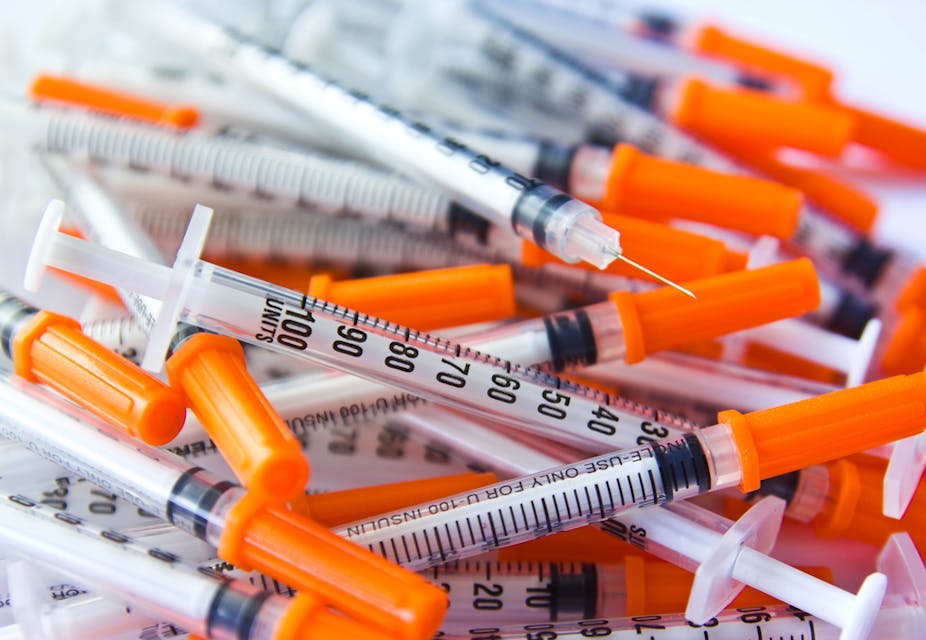An international trial testing a preventive drug treatment for HIV nearly halved the rates of HIV transmission among injecting drug users.
Injecting drug use causes one in ten new HIV infections worldwide. In regions such as Eastern Europe and central Asia, rates are far higher, with up to 80% of new HIV infections caused by injecting drug use.
The study, conducted by a team of researchers from the Thailand Ministry of Public Health and the United States Centers for Disease Control and Prevention, monitored 2,400 injected drug users over an average of four years in Bangkok, Thailand.
The researchers used the pre-exposure profilaxis (PrEP) method, where people who do not have HIV take a daily pill to reduce their risk of becoming infected.
Around half of the participants were provided with daily doses of anti-retroviral drug, Tenofovir, a drug used to prevent sexually transmitted HIV, while remaining participants received a placebo drug.
Participants were also given access to HIV counselling and testing, social services, primary medical care, methadone treatment, condoms, and bleach to clean injection equipment.
The study, published yesterday in The Lancet, found a reduction in HIV incidence by 48.9% in those on the anti-retroviral drug compared with the placebo group.
Dr Michael Martin, the trial’s Principal Investigator said the study “completes the picture” of pre-exposure profilaxis efficacy for major HIV risk groups, which includes those who contract HIV through sexual transmission.
“We now know that pre-exposure prophylaxis can be a potentially vital option for HIV prevention in people at very high risk for infection, whether through sexual transmission or injecting drug use,” he said.
Dr Amy Lansky, Deputy Director for Surveillance, Epidemiology and Laboratory Science, CDC Division of HIV/AIDS Prevention said the research provided evidence the preventive drug was safe and effective for people who injected drugs.
The next steps, she said, would be a consultation process with American HIV health professionals to consider “key implementation issues” in drug injecting populations, including strategies to support adherence under conditions that are “less controlled than they were in the study,” she said.
Professor David Cooper from the Kirby Institute commended the researchers on their quality findings, describing HIV treatment research for injected drug users as “controversial” and difficult to carry out in certain regions with adequate government support.
“In rich countries we’ve pretty much been able to stop transmission injectors by providing clean needles and syringes and also [providing] methadone programs to stop [people] using injection drugs,” he said.
“In some Asian countries and particular in Eastern Europe, governments won’t do that because they equate that to giving people drugs, that sort of incredibly false logic,” he said.
Dr Alex Wodak, Emeritus Consultant for Alcohol and Drug Service at St Vincent’s Hospital said the study raised some ethical questions.
“The ethics of conducting a trial of HIV prevention in a country where effective HIV prevention is extremely poor is very questionable and even more questionable when a major funder is from another country where this study would probably not be approved by ethics review boards,” he said.
Dr Wodak also questioned the cost effectiveness of the anti-retroviral drug, compared with alternative preventive methods that are proven effective and available now.
“In these financially difficult times, interventions not only have to be effective and safe but also cost effective,” he said.
“Tenofovir may be effective and safe in reducing HIV infections among people who inject drugs but is it as cost effective as reasonable quality methadone treatment and needle syringe programs?”
Dr Wodak said Thailand was still dithering about with needle syringe programs “26 years after the first epidemic of HIV among people who inject drugs in Thailand” and questioned how effective introducing Tenofovir would be in developing, drug conservative nations.
Dr Mark Stoove from the Burnet Institute said the study was “robust”, offering a high level of evidence regarding the effectiveness of anti-retroviral therapies for preventing HIV infection.
But he said this kind of preventative treatment was just one aspect of preventing HIV and the use of treatment drugs for preventing HIV need to be used in conjunction with other, equally important prevention methods, such as a “continued emphasis on education and health promotion around reducing risk.”
“Reducing risk in injecting drug users should primarily focus on preventing the sharing of needles and syringes and needs to be supported by ready access to clean injecting equipment,” he said.


